Nurs 6051 week 3 - Study guides, Class notes & Summaries
Looking for the best study guides, study notes and summaries about Nurs 6051 week 3? On this page you'll find 56 study documents about Nurs 6051 week 3.
Page 4 out of 56 results
Sort by
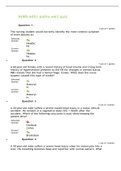
-
NURS 6051 WEEK 3 QUIZ – QUESTION AND ANSWERS (SET 2)
- Exam (elaborations) • 12 pages • 2021
-
- $10.99
- + learn more
NURS 6051 Week 3 Quiz with Answers The nursing student would correctly identify the most common symptom of brain abscess as: A 60-year-old female with a recent history of head trauma and a long-term history of hypertension presents to the ER for changes in mental status. MRI reveals that she had a hemorrhagic stroke. What does the nurse suspect caused this type of stroke? A 20-year-old male suffers a severe closed head injury in a motor vehicle accident. He remains in a vegetative state (VS...
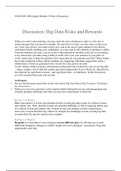
-
NURS 6051 Module 3 (Week 4) Discussion: Big Data Risks and Rewards
- Essay • 4 pages • 2020
- Available in package deal
-
- $7.29
- + learn more
NURS 6051 Module 3 (Week 4) Discussion: Big Data Risks and Rewards When you wake in the morning, you may reach for your cell phone to reply to a few text or email messages that you missed overnight. On your drive to work, you may stop to refuel your car. Upon your arrival, you might swipe a key card at the door to gain entrance to the facility. And before finally reaching your workstation, you may stop by the cafeteria to purchase a coffee. From the moment you wake, you are in fact a data-...
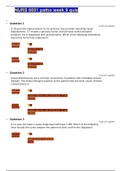
-
NURS 6051 Patho Week 9 Quiz
- Exam (elaborations) • 13 pages • 2021
-
- $16.49
- + learn more
NURS 6051 Patho Week 9 Quiz A 30-year-old male presents to his primary care provider reporting visual disturbances. CT reveals a pituitary tumor and lab tests reveal elevated prolactin. He is diagnosed with prolactinoma. Which of the following treatments would the nurse help implement? Visual disturbances are a common occurrence in patients with untreated Graves disease. The endocrinologist explains to the patient that the main cause of these complications is: A 12-year-old male is newly di...
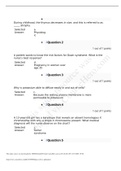
-
NURS 6051 Week 1 Quiz - patho: 2021 100% CORRECT
- Exam (elaborations) • 7 pages • 2021
-
- $12.49
- + learn more
NURS 6051 Week 1 Quiz 1. During childhood, the thymus decreases in size, and this is referred to as _____ atrophy. 2. A patient wants to know the risk factors for Down syndrome. What is the nurse’s best response? 3. Why is potassium able to diffuse easily in and out of cells? 4. A 13-year-old girl has a karyotype that reveals an absent homologous X chromosome with only a single X chromosome present. What medical diagnosis will the nurse observe on the chart? 5. A 20-year-old pre...
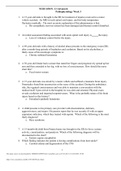
-
NURS 6051 Week 3 Quiz with Answers – Pathophysiology
- Exam (elaborations) • 4 pages • 2021
- Available in package deal
-
- $7.49
- + learn more
When a patient has a fever, which of the following thermoregulatory mechanisms is activated? A 15-year-old male is brought to the ER for treatment of injuries received in a motor vehicle accident. An MRI reveals spinal cord injury, and his body temperature fluctuates markedly. The most accurate explanation of this phenomenon is that: A child presents to his primary care provider with disorientation, delirium, aggressiveness, and stupor. His parents report that he was recently ill with an upper...
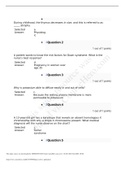
-
NURS 6051 Week 1 Quiz - patho: 2021
- Exam (elaborations) • 7 pages • 2021
-
- $10.49
- + learn more
NURS 6051 Week 1 Quiz 1. During childhood, the thymus decreases in size, and this is referred to as _____ atrophy. 2. A patient wants to know the risk factors for Down syndrome. What is the nurse’s best response? 3. Why is potassium able to diffuse easily in and out of cells? 4. A 13-year-old girl has a karyotype that reveals an absent homologous X chromosome with only a single X chromosome present. What medical diagnosis will the nurse observe on the chart? 5. A 20-year-old pre...
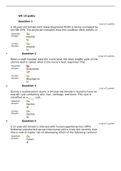
-
NURS 6051 Week 10 patho Quiz/Latest A+Guide
- Exam (elaborations) • 11 pages • 2021
-
- $7.49
- + learn more
NURS 6051 Week 10 patho 1. A 30-year-old female with newly diagnosed PCOS is being counseled by her OB-GYN. The physician indicates that this condition often results in: 2. When a staff member asks the nurse what the thick middle layer of the uterine wall is called, what is the nurse’s best response? The: 3. During a routine pelvic exam, a 34-year-old female is found to have an ovarian cyst containing skin, hair, cartilage, and bone. This cyst is classified as a _____ cyst. 4. A 21...
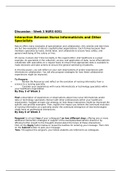
-
NURS 6051 Module 2 (Week 3) Discussion; Interaction Between Nurse Informaticists and Other Specialists
- Study guide • 6 pages • 2020
- Available in package deal
-
- $10.49
- + learn more
Nature offers many examples of specialization and collaboration. Ant colonies and bee hives are but two examples of nature’s sophisticated organizations. Each thrives because their members specialize by tasks, divide labor, and collaborate to ensure food, safety, and general well-being of the colony or hive. Of course, humans don’t fare too badly in this regard either. And healthcare is a great example. As specialists in the collection, access, and application of data, nurse informaticists c...

-
NURS 6051 Week 8 Quiz - 100% Correct Questions and Answers
- Exam (elaborations) • 12 pages • 2021
-
- $15.49
- + learn more
NURS 6051 Week 8 Quiz Question 1 When completing this quiz, did you comply with Walden University’s Code of Conduct including the expectations for academic integrity? Question 2 A 24-year-old male who sustained a head injury and fractured femur develops a stress ulcer. A common clinical manifestation of this ulcer is: Question 3 A 54-year-old male is diagnosed with peptic ulcer disease. This condition is most likely caused by: Question 4 A 45-year-old male complains of heartburn after eating ...
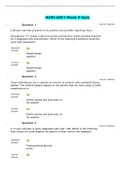
-
NURS 6051 Week 9 Quiz - 100% Correct Questions and Answers
- Exam (elaborations) • 12 pages • 2021
-
- $15.49
- + learn more
NURS 6051 Week 9 Quiz Question 1 A 30-year-old male presents to his primary care provider reporting visual disturbances. CT reveals a pituitary tumor and lab tests reveal elevated prolactin. He is diagnosed with prolactinoma. Which of the following treatments would the nurse help implement? Question 2 Visual disturbances are a common occurrence in patients with untreated Graves disease. The endocrinologist explains to the patient that the main cause of these complications is: Question 3 A 12-ye...

How much did you already spend on Stuvia? Imagine there are plenty more of you out there paying for study notes, but this time YOU are the seller. Ka-ching! Discover all about earning on Stuvia


